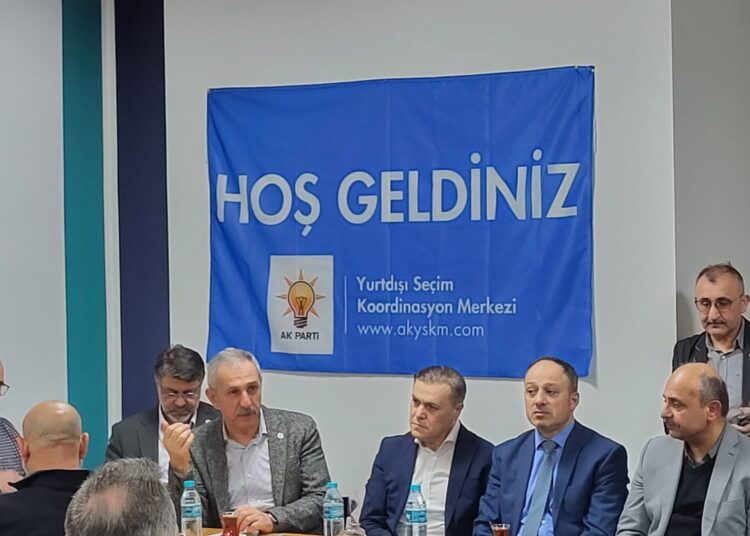Levent Kenez/Stockholm
With voting for Turkey’s May 14 elections under way in foreign countries, the president of the Union of International Democrats (UID), an organization that functions as an interest group abroad on behalf of the government of Turkish President Recep Tayyip Erdogan, claimed that the German authorities have attempted to make it difficult for Turks living in Germany to vote for Turkey’s ruling party and that it supports the outlawed Kurdistan Workers’ Party (PKK).
Erdogan’s Justice and Development Party (AKP) carries out its activities in 33 countries through the UID, often described as the long arm of President Erdogan, particularly in Europe, for mobilizing the Turkish and Muslim diasporas for the goals of political Islamists back in Turkey.
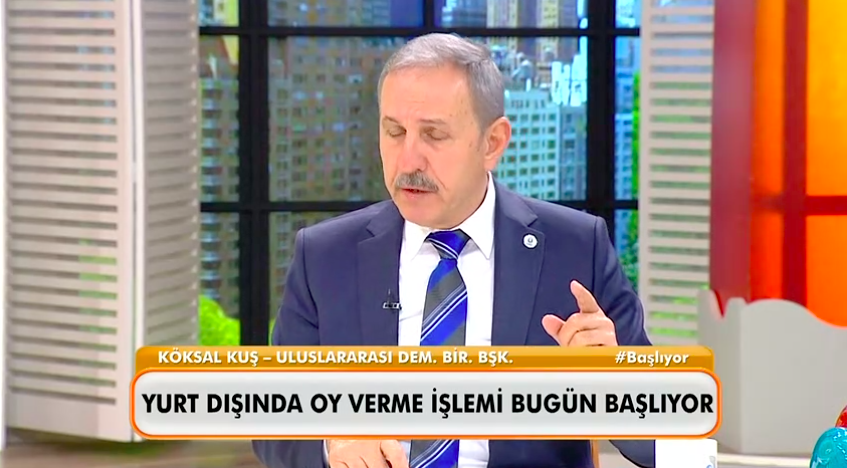
Speaking on the Kanal D TV channel owned by Yıldırım Demirören, a media mogul close to Erdogan, UID President Köksal Kuş criticized the German government, claiming that it did not allow polling places in several German cities for security reasons. He added that AKP supporters would disrupt the German government’s move by showing up in large numbers to vote.
According to a decision announced on April 26, the German government did not allow polling places in Dortmund, Fulda, Kassel, Siegen, Limburg, Kiel, Mannheim, Saarbrücken, Bielefeld and Ulm, where a significant number of Turkish citizens live. Turkish political parties previously had agreed on voting locations for Turkish citizens in these cities, which Turkey’s Supreme Board of Elections allowed and for which the Ministry of Foreign Affairs officially applied for permission.
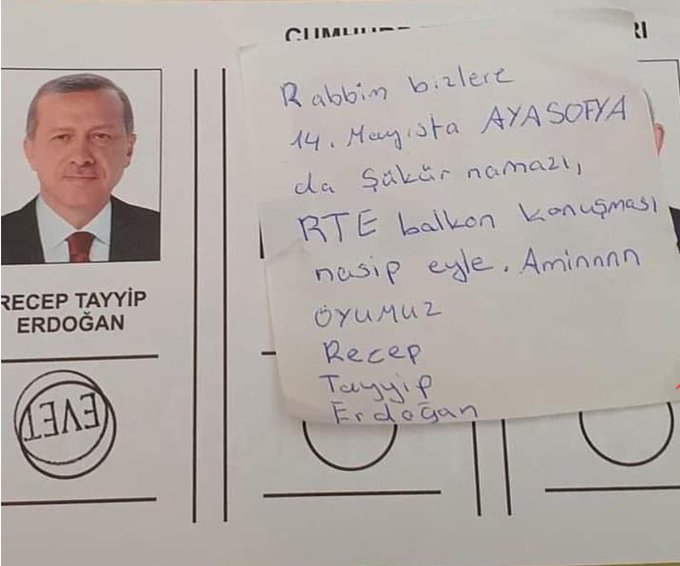
Kuş also claimed that the campaign ban starting 90 days before elections to be held in a foreign country according to German law has only been applied to the AKP and that German authorities ignore it for the main opposition Republican People’s Party (CHP) and pro-Kurdish Peoples’ Democratic Party.
However, Nordic Monitor research conducted on the social media accounts of the UID and the AKP’s foreign election committee suggests that AKP representatives and UID officials are conducting intense election work in Germany.
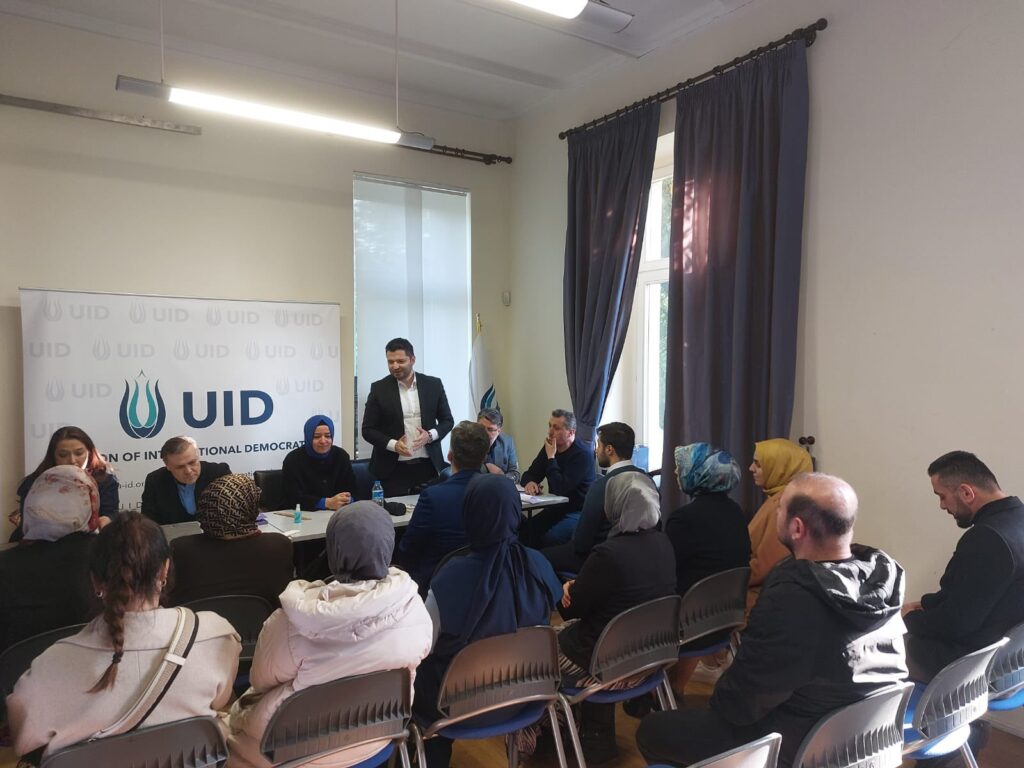
AKP ministers and deputies from Turkey have long been attending meetings held by the UID in Germany. Since the UID is a social association in the official records, their meetings are seen as social events, and Turkish politicians thus circumvent the the campaign ban during elections. Turkish politicians openly make election speeches at these meetings and ask for votes for Erdogan, harshly targeting opposition party supporters in Germany.
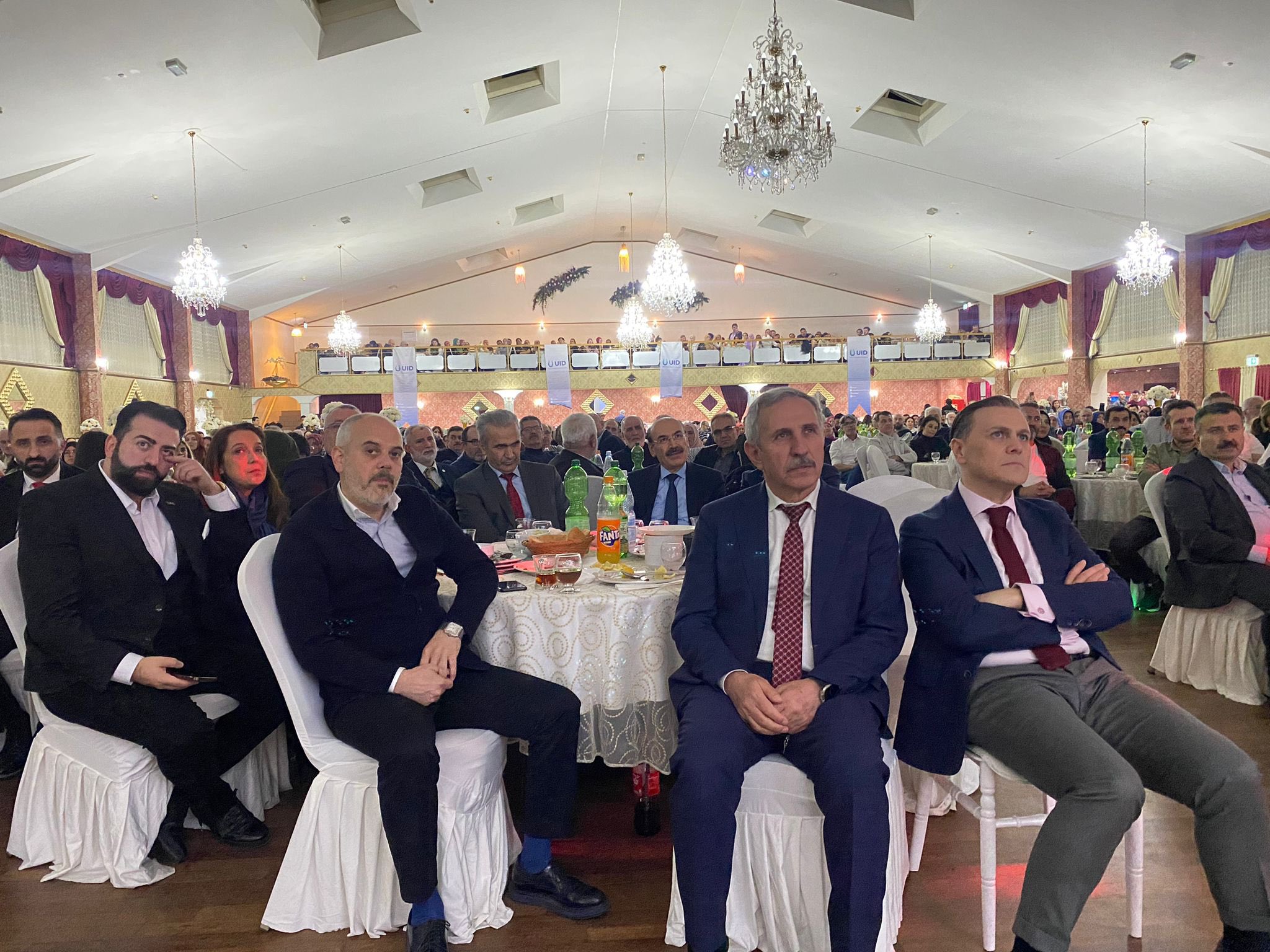
In January Mustafa Açıkgöz, a lawmaker from the AKP, called for the “destruction” of supporters of the outlawed Kurdistan Workers’ Party (PKK) and the Gülen movement, a group critical of the Erdogan regime, during a meeting of the Gray Wolves (Ülkü Ocakları), the youth organization of Turkish government partner the ultranationalist Nationalist Movement Party (MHP), in the German city of Neuss.
“Just as we won’t give them the right to live in Turkey, we won’t give them the right to live in Germany, either. No matter where they flee in the world, we will destroy the PKK and FETÖ terrorist groups,” Açıkgöz said, using a derogatory term coined by the Turkish government to refer to the Gülen movement as a terrorist organization, a claim the movement strongly denies.
The German Foreign Ministry summoned the Turkish ambassador and said there was no place for hate speech in Germany. In addition, the ministry warned Turkey in a statement on Twitter, reminding that official permission is necessary for political gatherings to which foreign politicians are invited. In addition, the prosecutor’s office in Neuss also launched an investigation into the alleged hate speech based on complaints it had received.
UID President Kuş, however, defended Açıkgöz’s statements on a YouTube channel that supports the Erdogan government. Claiming that the deputy was misunderstood, Kuş also said it doesn’t matter that Germany does not view members of the Gülen movement as members of a terrorist organization as the Turkish government does.
Claiming German authorities are tolerant of terrorists, Kuş also stated that German lawmakers attended the opening of the election office of the HDP, which the ruling party calls the PKK’s political arm.
Meanwhile, a notorious Twitter troll and the AKP Foreign Election Coordination Center’s vice chairman, Selman Kuzuoğlu, who lives in Germany, tweeted a video of the Kanal D show Kuş participated in and called on his followers to take note of the level of civilization in the West, complaining about the difficult conditions they were working under.
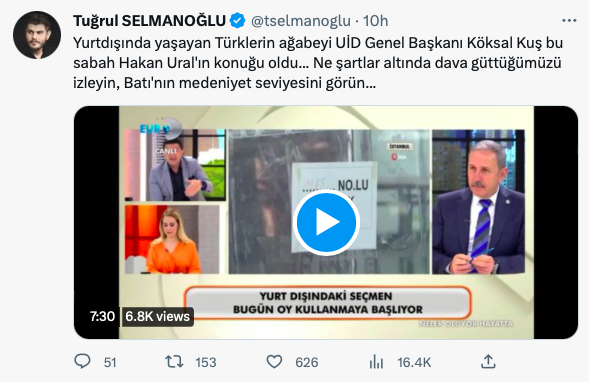
In 2021, when asked by Kuzuoğlu about “the fact that Erdogan supporters can’t find the opportunity to explain their case because of responding to the slander of the opponent mob on social media,” Erdogan told the UID delegates, “Don’t defend, attack, explain our cause!” He interestingly preferred a military term — “taarruz etmek” (to attack in Turkish) — showing that Erdoğan views the political struggle as a war.
In the 2018 presidential election, there were a total of 3,032,206 voters registered abroad, but the turnout was only 44 percent, meaning that only 1,335,901 people voted for the presidential candidates. Erdogan had achieved success well ahead of his rivals by garnering 59.41 percent of these votes. However, this success notwithstanding, the party that is exerting the most effort to win the votes of the European diaspora in the upcoming elections is again the ruling party.
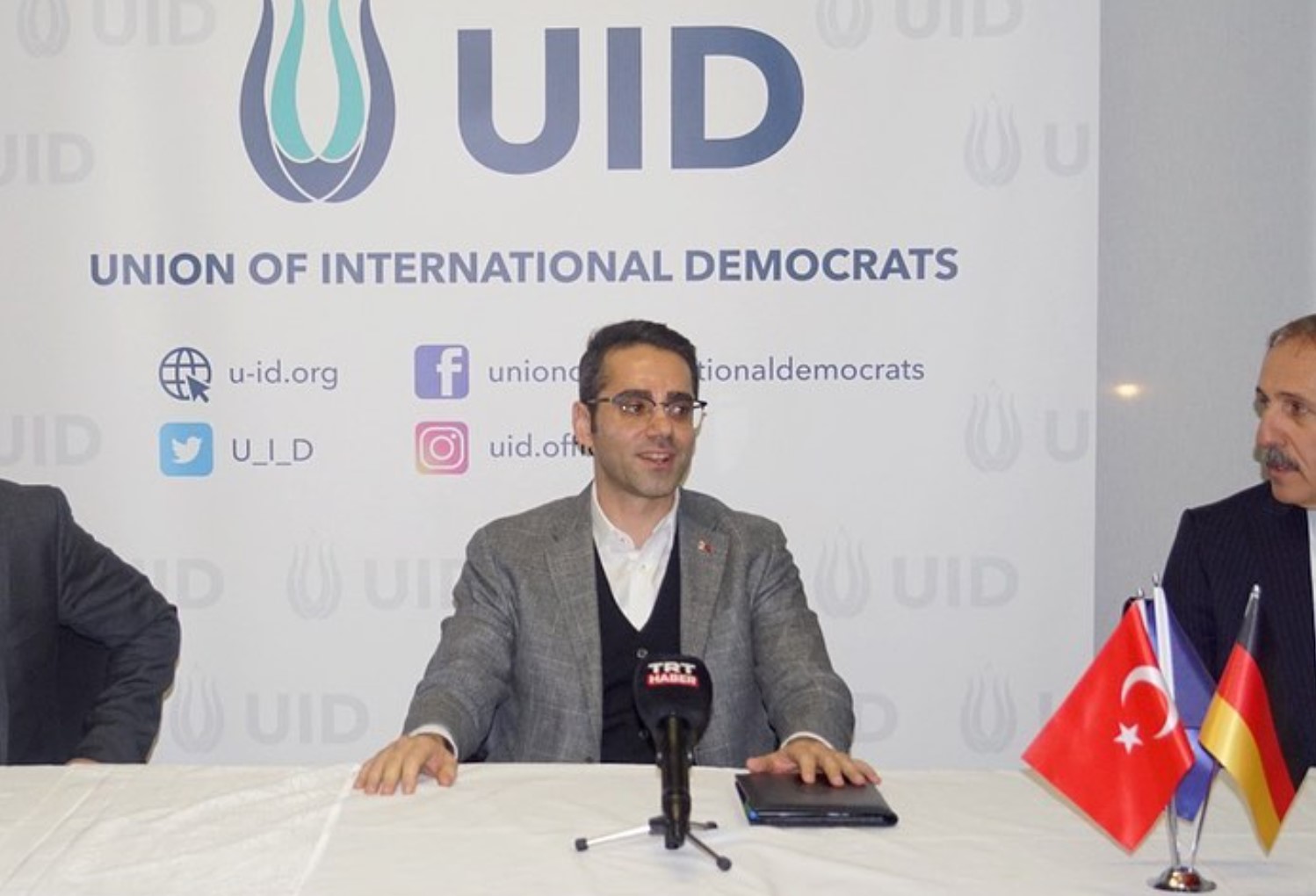
The opposition also has serious concerns about the votes cast abroad being counted fairly. Turkish citizens living overseas can vote in cities where Turkey has diplomatic missions. After the voting is over, the ballots are brought to Turkey by diplomatic courier. Deputy Foreign Minister Yasin Ekrem Serim, son of Maksut Serim, a chief advisor to the Turkish president who has managed a secret discretionary fund available for Erdogan’s personal use for years, is responsible for voting abroad, decides on the courier and how the ballots will be transported to Turkey. Given the fact that opinion polls predict the margin will be narrow, each vote counts.
There are other indications that the Ministry of Foreign Affairs cannot be impartial in the elections. Turkish diplomatic missions are organizing meetings for ruling party representatives to bring them together with Turkish citizens ahead of the elections. Party gatherings are deliberately presented by the visiting delegation as if they are public meetings with Turkish expatriates in the host country.

